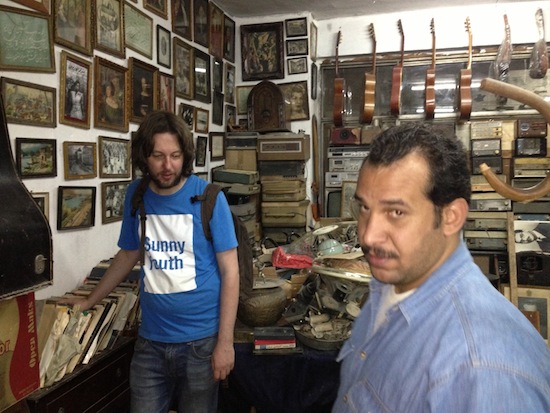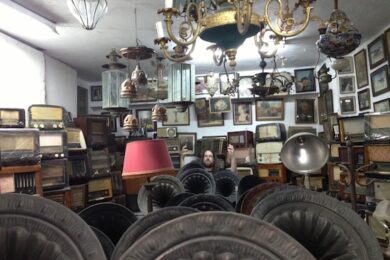Click here to read the rest of the Electro Chaabi In Cairo series
I wake up very sad that I’m leaving Cairo. I decide to take a tried and tested route to comfort and solace: food and record shopping. Sitting under the large flyover by my hotel outside a small cafe, I have an excellent dish of kosheri (a mix of green lentils, rice, noodles, small tubes of pasta and crisply fried onion cooked in cinnamon and covered in spicy tomato sauce), a falafel sandwich (only one this time) and for dessert a roasted sweet potato served with honey, molasses and cinnamon. The diet I’ve been talking about since 2007 can start when I get home.
After doing some research on the internet, I tell Joost about one of the second hand record dealers not too far away from the hotel: "According to the website of the Egypt Independent they have stone records."
He says: "Records by the Rolling Stones?"
I reply: "No. Stone records. Records made from rock."
He looks confused: "Rock records but not by the Rolling Stones?"
I try and explain: "No, this article says they have 100-year-old records that are literally made from stone. Maybe we’ll strike lucky and get War Master by Bolt Thrower on granite."
Disappointingly, once we find Mazeeka Samir Faoud, it appears these artefacts are actually the old 10" shellac discs for gramophone records, and not discs hewn from onyx by Rameses’ own dub-cutting lathe. There is literally no end to the crazy shit I will believe if I read it in a convincing enough font. There is nothing else disappointing about this bewildering grotto of music and film relics and ephemera, however. It is packed to the gills with giant reconditioned gramophone players, huge valve radios and other long outdated formats for playing music. The walls are lined with Egyptian film posters and portraits of stars such as Umm Kulthum and Abdul el-Halim Hafez, the Nightingale of the Nile. I buy a (literally) dusty pile of albums by the former and Joost buys some jazz 7"s. I waver dangerously for a second when he offers to sell me one of the many pear-shaped ouds hanging from the ceiling.

But now the evil genie has been let out of the bottle, and only severe wax placation will persuade him to return to his green glass hovel, so we start tramping round looking for every record shop we can find. They range from the bad (a stereo repair shop that happens to have two Egyptian albums marked up by five times from what they should be priced, two Elkie Brooks and Def Leppard’s Hysteria) to the very good.
In the latter camp is Sawt Al-Qahira, or Sono Records – perhaps the only record label whose headquarters also contain a mosque. Their legendary back room full of "estowanat" or unsold vinyl has been plundered down to a lonely looking cardboard box of Egyptian to English language lesson albums, but we stock up on Umm Kulthum, classic oud and Chaabi.
For our last night out we elect to take a nighttime walking tour of the centre of the city with a local photographer, who is also making his name as an internationally respected artist called Ayman Ramadan.
We meet him at the coffee shop near the art space where he works. He is a bridge between the street aspects of the new culture – not just the music but the fashion and the graffiti – and how this is affecting more acceptable middle class art forms. He grew up in a small town called Sharkie that offered him "no options" so he moved to Cairo to find work as a mechanic, a waiter, a builder, whatever he could find.
He is a very zen guy, very relaxed, and this seems at odds with the picture he paints of himself as a youth: "I chose to stay homeless so I could send money home because there was no work in Sharkie. I told them on the phone that I had a nice flat, so I didn’t have to have really depressing conversations with them!
"In some respects it was tough because I had to learn how to fight. People will take advantage of you if you are weak when you are homeless in Cairo, so you have to be able to stand up to them. Even if someone said something to me, I would fight them."
He laughs and points at the Down Town street we are passing. "That is where I met William Wells who gave me my first job at the Townhouse Gallery in 1999. I was fighting with my boss at the time, who had suddenly decided that he wasn’t going to pay me my full salary, which was only 20 Euros for the month. We were fighting and William came over to see what was going on and I hit him with a chair because he was in the way.
"Afterwards he said, ‘Why are you so angry? Come and work for me – I need someone to do security’. And that was the first time I had options."
We walk down Market Il Wekel. Since the revolution there has been a smaller police and security presence on the streets for minor affairs, so this giant (it feels longer than Walthamstow Street Market, which is the lengthiest in Europe) strand of ramshackle clothes stalls sprang up because no one had the time to prevent it.
Ayman tells us about how he used his spare time to learn about taking photographs, painting, art history and sculpture. He eventually earned a scholarship to study art at university in San Francisco and then moved back home about four years ago to put into practice what he had learned. He became the first ever graffiti artist in Cairo, and paid the price.
One of his first attempts, a fairly basic stencil of a person wielding a broom (Ayman is interested in Cairo being clean) on a pavement, led to two people he knew getting arrested. Fearing they were being tortured – a not uncommon plight of people in custody during Mubarak’s regime – he handed himself in, where he underwent a lengthy and terrifying interrogation. (For the full Kafka-esque story, involving police officials thinking it was a Communist plot against the state, read Yasmine El-Rashidi’s article for The Index On Censorship).
However, his efforts have met with a much more enthusiastic response in other quarters. He has now exhibited all over the world – including Cairo. He has had a film on exhibit at the Tate Modern in London and is currently showing at the Sharjah Biennale. He has also become a keen photographic documenter of the Electro Chaabi scene, seeing its practioners as being like himself.
When I ask him as someone who started with few options in life what value he puts on art and photography – creativity in general – he says: "It’s taught me that anger isn’t the best way to get what you want, that sometimes if you are polite you can get what you want. I have learned a lot about life itself through art."
We pass along the Nile looking for a boat to take an hour long trip on. We pass Chaabi floka boats, that are covered in neon lights, lasers, pumping out banging tunes gearing up for a big night.
"Big groups of young people get on one and take it out for a party," he tells us. "It’s a good option for them as it only costs two Egyptian Pounds each for an hour.
"Everyone can enjoy the Nile, no matter what class they are. Poor people, middle class people, tourists, the rich, the young, the old, families…"
We get on an old, wooden flocka and we float lazily round the Nile as many different boats pass us. The flashing electro chaabi boats, a wedding flocka pumping out Sadat to a giddy crowd all on deck, an expensive looking boat with young men doing what looks like unhinged Cossack dancing on the roof.
We sit in silence, in the dark, smoking cigarettes and watching as all through 360 degrees around us floating parties are taking place. Boats as wedding receptions. Boats as nightclubs. Boats as Youth Clubs. Boats as formal family gatherings. The ostentatious Pharaonic cruise ship / floating restaurant glides past. There is no one on deck. The people inside are as sealed off from the actual Cairo as the people sipping Pimms in the gardens of the Marriott were. It is supposed to look like the gleaming barge that carried Cleopatra’s burning golden throne up the Nile but it looks like a gigantic, floating TGI Fridays.
"That’s pretty gaudy," I say to Joost without giving it much thought.

Afterwards we walk back from the Nile to Down Town to eat with Ayman before calling it a night. From the Four Seasons to the Garden City to Monuir which, for Cairo, is unusually quiet, it should be a straight route, but we come to a giant fortified concrete wall blocking our way.
"They closed off this section of the city with concrete to protect government buildings after the revolution," he tells us. As we head circuitously round back to Down Town, the traffic starts picking up again. There are police trucks everywhere.
Our last stop is El Tahrir, the best kosheri joint in all of Cairo, and it doesn’t disappoint. I add extra viscous red liquid from a pear shaped glass jar to mine. It seems to have the same active ingredient as the stuff that pours out of the face hugger in Alien and melts through three decks of the Nostromo.
We bid goodnight to Ayman and get a cab back to the hotel. During the cab ride which sees us drive through a covered back street market – every time our driver takes an unexpected turning or drives on a pavement he shouts, "Street wise! Street wise!" – we start talking etymology.
"Gaudy is a shit word. I wish I hadn’t used it. I’m pretty sure it comes from English people visiting Spain and seeing Antoni Gaudí’s architecture," I say to Joost.
He says: "That’s interesting. Do you know the English word ‘shabby’? It comes from chaabi. Colonial people took it back to your country with them."
I say: "Typical bloody English."
As our driver comes off the Nile bridge flyover for 26th July Street he starts fiddling with a window control which is jammed and doesn’t notice the slip road curving round. We’re heading straight for pedestrians – and a 20ft drop behind that.
"Shit!" I yell like Alan Partridge.
There is a slap like a bag of concrete being dropped onto a pavement from a first floor window. The driver groans and slows down.
I look over my shoulder but thankfully we’re looking at a very angry Egyptian man rubbing his elbow, and his companions shaking their fists in the air.
We get out without going the whole distance to the hotel. I still tip him. It doesn’t occur to me not to. "Street wise," he says sheepishly, and drives off. The relief makes us both laugh, but any thoughts of staying out have evaporated. We head straight for our rooms and sleep.
And now it’s Friday morning and I’m in another cab heading back to the airport. Goodbye beautiful Cairo! Goodbye Sono Records! Congratulations Sadat and Samer! Goodbye all of my new friends! But what is this? My cabbie is only driving at 90 miles per hour? We could have been there twenty minutes ago! Put your foot down sir! Yalla! Yalla! Yalla!



